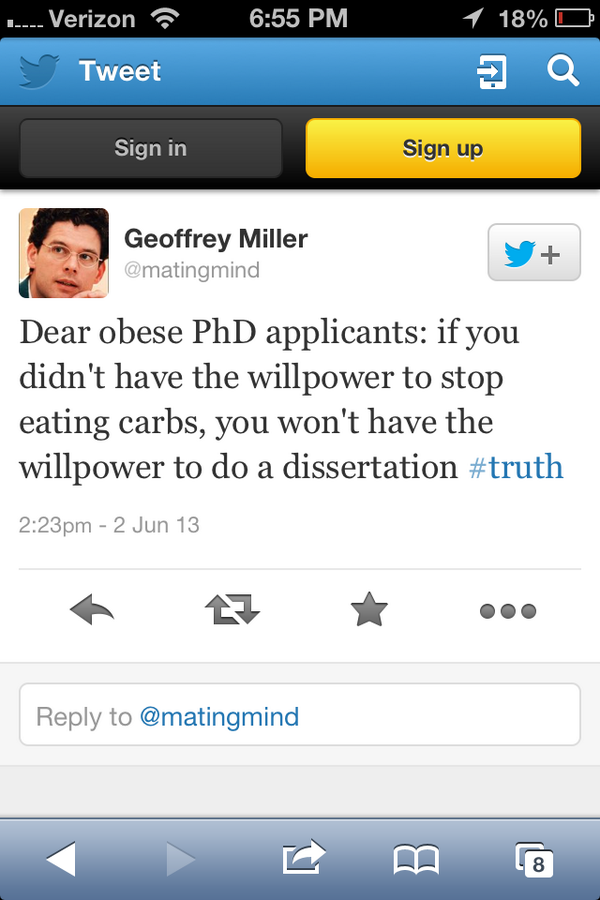Igår skrev jag om hur forskare bör använda sig av sociala medier för att kommunicera vetenskap med allmänheten. Men jag nämnde att det inte är oproblematiskt och att twittrande forskare kan riskera sitt rykte, särskilt om det då och då slinker med en tweet som inte är helt genomtänkt. Jag kom faktiskt att tänka på ett exempel då en forskares twittrande haft förödande konsekvenser för dennes rykte.
Just nu läser jag boken The Mating Mind av evolutionspsykologen Geoffrey Miller. I denna bok föreslår Miller en mängd hypoteser om hur många komplexa mänskliga beteenden har formats genom sexuell selektion. Miller anser bland annat att dessa beteenden ligger bakom kulturella fenomen som konst, musik, sport, drama, komik samt politiska ideal och denna bok gjorde Miller världsberömd. Nuförtiden är Miller dock mest känd för att han hamnade i blåsväder när han skickade följande tweet:
Eller på svenska:
”Kära överviktiga doktorandansökande; om du inte hade viljestyrka nog att sluta äta kolhydrater kommer du inte vara viljestark nog att disputera. #sanning”
Detta tweet resulterade (såklart) i att Miller blev väldigt kritiserad. Miller försökte initialt släta över det hela och påstå att det var en del av ett forskningsprojekt, vilket universitetet där Miller arbetar senare dementerade. Jag vet inte exakt vilka konsekvenser detta uttalande hade för Miller men det är tydligt att han gått från att vara en världsberömd forskare och författare till att vara mest känd för den så kallade ”Twitter obesity controversy”.
Visst är det bra med fler forskare på sociala medier, men det gäller att tänka först och twittra sen, särskilt om man är en inflytelserik person. Kan inte påstå att jag själv lever som jag lära, får skärpa till om jag en dag får inflytande 😉
What researchers shouldn’t tweet
Yesterday, I wrote about how researchers should use social media to communicate science with the public. But I mentioned that this is not unproblematic, and that twittering scientists could risk their reputation, especially if some occasional tweets have not been well thought out. This made me remember an example of a researcher whose twitter activity had devastating consequences for his reputation.
I am currently reading the book “The Mating Mind” by evolutionary psychologist Geoffrey Miller. In this book, Miller suggests that many complex human behavior traits have been shaped by sexual selection. Miller believes, among other things, that these behaviors explain cultural phenomena such as art, music, sports, drama, comedy and political ideals, and this book made Miller famous all over the world. Today, however, Miller is best known for when he ended up in trouble after sending the tweet above.
This tweet resulted (of course) in that Miller was hugely criticized. Miller initially tried to deny the whole thing and say that it was part of a research project, which the university where Miller works later denied. I do not know exactly what consequences this event had for Miller but it is clear that he has gone from being a world-renowned researcher and author to be best known for the so-called “Twitter obesity controversy”.
Of course, it would be great with more researchers on social media, but remember to think before you tweet, especially if you are an influential person. Can not say that I practice what I teach, might have to shape up if I one day get to influence people 😉
